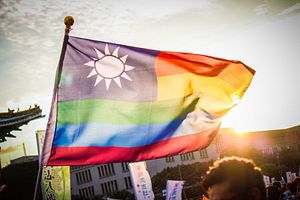On May 24, the gay, lesbian, and bisexual (LGBT) citizens of Taiwan achieved a major victory when the self-governing island’s highest court, the Judicial Yuan, ruled that denying same-sex couples the right to marry violated their right to equality under the Taiwanese constitution. After decades of progress on LGBT issues in Western Europe and North and South America, one might conclude that the ruling was simply the latest domino to fall in the long march towards marriage equality.
But the ruling has a broader and deeper significance beyond changing global attitudes towards the LGBT community. It’s also a testament to the robust democracy that the Taiwanese have built in a region that is often lacking in rule of law and pluralistic values.
Rising prosperity and relaxation of political controls have led to improvements on some social and political issues in many East Asian states, but LGBT rights have not moved at the same pace. Only a handful of East Asian countries allow openly LGBT citizens to perform military service, and none allows same-sex couples to adopt. Homosexual relationships remain illegal in Singapore, Malaysia, Brunei, and parts of Indonesia. And, until last week, no government granted any legal status to same-sex relationships.
The Judicial Yuan’s ruling thus represents more than a victory in a local culture war. Rather, it serves as a powerful validation of an idea that until now has struggled to gain traction in East Asia: that an Asian society, acting through its own institutions and drawing on its own traditions, can affirm the basic rights of LGBT citizens and afford same-sex relationships the same dignity before the law as that granted to different-sex unions.
That Taiwan should be the first Asian polity to recognize same-sex marriage is, on some level, unsurprising. Taiwan has long been home to one of Asia’s most vibrant LGBT communities, part of a dynamic social fabric in a society that has embraced diversity and the expression of minority cultural and political views. For years, Taipei has been home to Asia’s largest gay pride festival, and a poll last year indicated that a slight majority of Taiwanese citizens supported same-sex marriage. The Democratic Progressive Party (DPP), which currently holds a legislative majority and the presidency, has also been supportive of LGBT rights.
The causes of Taiwanese pluralism and tolerance are multifaceted. To some extent, they have arisen organically in a society that has few restrictions on speech or social and political activities and welcomes engagement with the outside world. But another critical factor has been a conscious effort by Taiwanese authorities, especially the DPP, to develop a distinct Taiwanese political and cultural identity predicated in key part on respect for civil liberties. One notable consequence of this effort has been reform of the state educational curriculum, historically a powerful shaper of social norms, to deemphasize traditional Confucian moral guidance in favor of pluralistic values.
Yet there is another reason Taiwan is the only polity in Asia that could have produced last week’s ruling: Taiwanese political elites’ deep commitment to rule of law and constitutionalism, even at the expense of executive authority.
Many countries in East Asia lack an independent judiciary with authority to invalidate executive acts and legislation. Some—such as Japan, Indonesia, and Thailand—have courts with the authority to engage in judicial review, but they play a comparatively muted role in national life. Japan’s Supreme Court, for example, has only struck down eight laws as unconstitutional in its 70-year history.
The Judicial Yuan, by contrast, had a central role in the liberalization of Taiwan’s political system and has exhibited a zeal in defending democratic liberties and rule of law that has no equivalent elsewhere in East Asia.
Most famously, in 1990, the Judicial Yuan ordered the retirement of a large contingent of politically reactionary legislators who had not been required to face reelection for more than four decades, clearing the way for major democratic reforms. During the 1990s, the court also struck down longstanding bans on political speech, lessened the role of the military in civilian life, and enhanced procedural protections for criminal defendants.
With this perspective in mind, it’s possible to view the Judicial Yuan’s ruling as the product of a distinctly Taiwanese political culture anchored in respect for the rights of the individual and a government of laws rather than men. That political culture, in turn, offers a compelling argument for why the United States should conceive of its relationship with Taiwan in terms of shared values, rather than solely on the basis of strategic interests.
At a time when Taiwan is still viewed by many U.S. policymakers as a chess piece in a long-running contest with Beijing, the ruling is a necessary reminder that the island has emerged as a beacon of liberal values unlike any other in East Asia.
Trevor Sutton is a senior fellow at the Center for American Progress. Brian Harding is Director for East and Southeast Asia at the Center. Both authors previously served in the Office of the Deputy Assistant Secretary of Defense for South and Southeast Asia in the Pentagon.

































